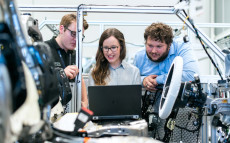- pathfindersAI
- Job Profile
Automotive Service Technicians and Mechanics
Summary
Automotive Service Technicians and Mechanics: A Career Overview
What They Do
Automotive Service Technicians and Mechanics, often referred to simply as mechanics, are professionals trained to diagnose, repair, and maintain vehicles. Their work environment spans a range of settings, from specialized repair shops to large-scale dealerships and even private businesses. Utilizing a blend of hands-on skill and technical knowledge, these professionals ensure that vehicles operate safely and efficiently on the road. Their tasks encompass a variety of areas including but not limited to engine repair, brake systems, electrical systems, and general vehicle maintenance. The role of a mechanic is integral to the transportation industry, facilitating the safe and efficient movement of people and goods.
Job Responsibilities
The responsibilities of Automotive Service Technicians and Mechanics are both diverse and detailed. They begin with diagnosing vehicle issues, often using advanced diagnostic equipment to pinpoint the root cause of a problem. Following diagnosis, repair work can include tasks such as replacing worn parts, conducting engine tune-ups, performing oil changes, and fixing electrical malfunctions. Mechanics also perform extensive inspections of vehicles to identify potential issues before they become significant problems. Documentation is another crucial responsibility; service records and vehicle histories must be meticulously maintained. Additionally, some mechanics may specialize in specific areas such as transmission repair, diesel engine work, or automotive air-conditioning systems.
Essential Skills
Success in the field of automotive technology demands a compilation of essential skills. Mechanical aptitude and a strong understanding of vehicular systems are foundational. Problem-solving capabilities are also essential, as mechanics must be able to diagnose issues accurately and develop effective repair strategies. Physical dexterity is crucial for handling tools and making precise adjustments. Interpersonal skills should not be underestimated, as mechanics frequently interact with customers to explain vehicle issues and recommend solutions. Proficiency in using diagnostic software and equipment is increasingly critical in an era of computerized automotive systems. Continuous learning is another necessary skill, given the rapid advancements in automotive technology.
Educational Pathways
The journey to becoming an Automotive Service Technician or Mechanic can follow multiple educational pathways. While some enter the field through hands-on apprenticeships or vocational training programs, others may choose to pursue formal education at technical schools or community colleges. These programs typically offer certificates, diplomas, or associate degrees in automotive technology. Course curricula often include classroom instruction combined with practical, hands-on training in areas such as engine performance, brake systems, and electronic diagnostics. Additionally, certification from recognized industry organizations, such as the National Institute for Automotive Service Excellence (ASE), can significantly enhance career opportunities and professional credibility.
Career Prospects
The career prospects for Automotive Service Technicians and Mechanics are promising, given the continual demand for vehicle maintenance and repair. According to the Bureau of Labor Statistics, the employment of mechanics is projected to grow steadily. Industry advancements, particularly in electric and hybrid vehicles, are expected to generate new job opportunities. Moreover, mechanics with specialized skills or certifications may find themselves in higher demand and positioned for advancement into supervisory roles or specialized fields. The automotive industry’s commitment to innovation suggests that those willing to continually update their skills and knowledge can enjoy long-term career stability and growth.
Conclusion
In conclusion, a career as an Automotive Service Technician or Mechanic offers a blend of hands-on work, technical challenge, and satisfying problem-solving opportunities. The role is indispensable to ensuring the functioning and safety of vehicles, making it a critical component of the broader transportation sector. From diagnosing complex engine problems to performing routine maintenance, mechanics play a vital role in keeping our roads safe. With a range of educational pathways and a positive career outlook, this profession provides a rewarding avenue for those interested in automotive technology and repair. Pursuing this career not only promises personal fulfillment but also offers a stable and evolving professional journey.
Video
Compensation
| State | Median Salary | Median Hourly | Positions |
|---|---|---|---|
| AL | 45,380 | 21.82 | 9,320 |
| AK | 60,810 | 29.24 | 1,590 |
| AZ | 48,370 | 23.25 | 16,610 |
| AR | 40,290 | 19.37 | 5,660 |
| CA | 61,610 | 29.62 | 55,730 |
| CO | 50,940 | 24.49 | 12,440 |
| CT | 49,220 | 23.66 | 6,770 |
| DE | 51,430 | 24.73 | 1,820 |
| DC | 62,940 | 30.26 | 340 |
| FL | 45,790 | 22.02 | 46,210 |
| GA | 46,360 | 22.29 | 23,970 |
| HI | 49,700 | 23.90 | 2,750 |
| ID | 46,020 | 22.13 | 4,760 |
| IL | 48,530 | 23.33 | 28,030 |
| IN | 46,800 | 22.50 | 14,990 |
| IA | 46,700 | 22.45 | 7,900 |
| KS | 46,100 | 22.17 | 5,660 |
| KY | 38,080 | 18.31 | 10,590 |
| LA | 45,410 | 21.83 | 8,400 |
| ME | 48,090 | 23.12 | 3,220 |
| MD | 55,190 | 26.53 | 14,340 |
| MA | 49,610 | 23.85 | 13,920 |
| MI | 47,880 | 23.02 | 19,530 |
| MN | 49,290 | 23.70 | 12,120 |
| MS | 36,900 | 17.74 | 6,390 |
| MO | 45,450 | 21.85 | 17,250 |
| MT | 48,790 | 23.46 | 2,580 |
| NE | 47,590 | 22.88 | 4,340 |
| NV | 46,490 | 22.35 | 6,650 |
| NH | 50,000 | 24.04 | 3,930 |
| NJ | 53,280 | 25.62 | 14,880 |
| NM | 44,030 | 21.17 | 5,410 |
| NY | 47,860 | 23.01 | 31,760 |
| NC | 46,560 | 22.39 | 24,300 |
| ND | 48,520 | 23.33 | 2,150 |
| OH | 44,460 | 21.38 | 22,510 |
| OK | 42,070 | 20.23 | 9,180 |
| OR | 48,840 | 23.48 | 6,910 |
| PA | 47,900 | 23.03 | 29,100 |
| RI | 46,960 | 22.58 | 2,480 |
| SC | 44,210 | 21.25 | 14,170 |
| SD | 46,520 | 22.36 | 2,250 |
| TN | 46,170 | 22.20 | 16,430 |
| TX | 46,800 | 22.50 | 67,680 |
| UT | 47,010 | 22.60 | 8,200 |
| VT | 47,100 | 22.65 | 1,570 |
| VA | 48,830 | 23.47 | 19,120 |
| WA | 57,550 | 27.67 | 12,390 |
| WV | 37,150 | 17.86 | 4,010 |
| WI | 49,040 | 23.58 | 12,750 |
| WY | 46,440 | 22.33 | 1,500 |
Similar Occupations
In this area you will find other occupations that are close to the one you were viewing in tasks, knowledge and work environment. If the primary job profile you are viewing isn't quite to your liking, take a look around and see what else is available.
Basic and Premium Accounts have more alternative occupations available than the Free account.

Automotive Body and Related Repairers - 49-3021.00
Automotive Body and Related Repairers restore the structural integrity and appearance of vehicles by repairing, replacing, and refinishing damaged car frames and body panels. They use specialized tools and techniques to bring vehicles back to their pre-accident condition, ensuring both functionality and visual appeal.
-
$48,740/yr
Median Pay -
151,910
Number of Jobs

Automotive Engineering Technicians - 17-3027.01
Automotive Engineering Technicians assist in the development, testing, and fine-tuning of vehicle systems and components by conducting performance assessments and implementing design improvements. They collaborate with engineers to troubleshoot issues, ensure compliance with safety standards, and enhance the efficiency and reliability of automotive technologies.
-
$64,020/yr
Median Pay -
38,930
Number of Jobs